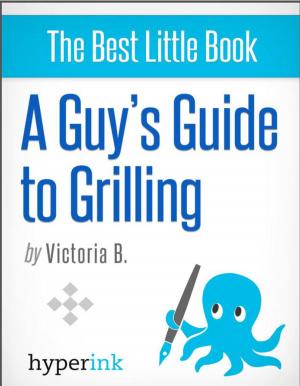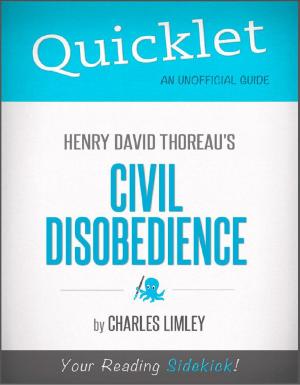Quicklet on Robert Heinlein's Stranger in a Strange Land (CliffNotes-like Book Summary and Analysis)
Nonfiction, Reference & Language, Study Aids, Book Notes, Art & Architecture, General Art| Author: | Joseph Pritchard | ISBN: | 9781614646877 |
| Publisher: | Hyperink | Publication: | July 30, 2012 |
| Imprint: | Hyperink | Language: | English |
| Author: | Joseph Pritchard |
| ISBN: | 9781614646877 |
| Publisher: | Hyperink |
| Publication: | July 30, 2012 |
| Imprint: | Hyperink |
| Language: | English |
ABOUT THE BOOK
I believe it was Arthur C. Clarke who once said that science fiction rarely tries to predict the future, but rather tries to prevent it. In many ways, he’s absolutely right. The purpose of great science fiction isn’t to show us what our future will be, but to help us reflect, question and ultimately transcend the limitations of our current mindset.
When we consider the great science fiction writers of the previous two centuries. Literary greats such as Verne, Wells, Niven and Asimov may have spun tales that were highly engaging thought experiments, possibly thought-provoking, but ultimately no more able to predict the future than say one’s daily horoscope.
Naturally, when it comes to an author of Robert Heinlein’s somewhat conservative orientation, Stranger in a Strange Land is somewhat surprising. The novel was published in 1961 and as such reflects much of the “morés” prevalent during the late 1950s and early 1960s. As such, themes such as “free love” versus religious conservatism clash. Consider for instance how one of the novel’s female characters opines that women are to blame for ninety percent of rapes. Such a view may have been typical in the 1950s, but it isn’t one that is as widely embraced.
The novel’s main protagonist takes on a somewhat Messianic figure. But what’s interesting is the novel remains unclear about whether or not this is meant to be a good or bad thing.
EXCERPT FROM THE BOOK
There is a great deal of philosophizing in addition to a rather cinematically pleasing display of his special abilities. Harshaw also asks Jill to try to learn Martian from Smith in order to better facilitate communication with him. The readers learn of Smith’s remorse over his using his powers to make the government agents that were chasing them “disappear”.
However, we also learn that the Martians in the novel’s world seem to practice ritualistic cannibalism. In fact, Smith actually articulates his desire to eat Harshaw’s corpse when he passes. This does not sit well with Duke, Harshaw’s manservant, who is also in charge of maintaining everything technological within the household.
Harshaw actually almost fires Duke after the latter shared his misgivings about Smith’s apparent cannibalism. In fact, Duke even refuses to eat at the same table as Smith, a sentiment that incites Harshaw’s anger. Duke would have lost his job had he not also told Harshaw that despite his misgivings about the strange man, Duke did not consider Smith dangerous. Harshaw tells Duke that he can keep his job so long as he continues to eat at the same table as everyone. He also encourages Duke to become Smith’s “water-brother”, albeit warning him not to take the ceremony lightly.
Duke seems to represent the typical Westerner’s response to Smith’s “alien” culture, whereas Harshaw is meant to be more open-minded and accepting of individualism...
Buy the book to continue reading!
Follow @hyperink on Twitter!
Visit us at www.facebook.com/hyperink!
Go to www.hyperink.com to join our newsletter and get awesome freebies!
CHAPTER OUTLINE
Quicklet on Robert Heinlein's Stranger in a Strange Land
Robert Heinlein's Stranger in a Strange Land
+ About the Book
+ Introducing the Author
+ Overall Summary
+ Chapter-By-Chapter Summary and Commentary
+ ...and much more
ABOUT THE BOOK
I believe it was Arthur C. Clarke who once said that science fiction rarely tries to predict the future, but rather tries to prevent it. In many ways, he’s absolutely right. The purpose of great science fiction isn’t to show us what our future will be, but to help us reflect, question and ultimately transcend the limitations of our current mindset.
When we consider the great science fiction writers of the previous two centuries. Literary greats such as Verne, Wells, Niven and Asimov may have spun tales that were highly engaging thought experiments, possibly thought-provoking, but ultimately no more able to predict the future than say one’s daily horoscope.
Naturally, when it comes to an author of Robert Heinlein’s somewhat conservative orientation, Stranger in a Strange Land is somewhat surprising. The novel was published in 1961 and as such reflects much of the “morés” prevalent during the late 1950s and early 1960s. As such, themes such as “free love” versus religious conservatism clash. Consider for instance how one of the novel’s female characters opines that women are to blame for ninety percent of rapes. Such a view may have been typical in the 1950s, but it isn’t one that is as widely embraced.
The novel’s main protagonist takes on a somewhat Messianic figure. But what’s interesting is the novel remains unclear about whether or not this is meant to be a good or bad thing.
EXCERPT FROM THE BOOK
There is a great deal of philosophizing in addition to a rather cinematically pleasing display of his special abilities. Harshaw also asks Jill to try to learn Martian from Smith in order to better facilitate communication with him. The readers learn of Smith’s remorse over his using his powers to make the government agents that were chasing them “disappear”.
However, we also learn that the Martians in the novel’s world seem to practice ritualistic cannibalism. In fact, Smith actually articulates his desire to eat Harshaw’s corpse when he passes. This does not sit well with Duke, Harshaw’s manservant, who is also in charge of maintaining everything technological within the household.
Harshaw actually almost fires Duke after the latter shared his misgivings about Smith’s apparent cannibalism. In fact, Duke even refuses to eat at the same table as Smith, a sentiment that incites Harshaw’s anger. Duke would have lost his job had he not also told Harshaw that despite his misgivings about the strange man, Duke did not consider Smith dangerous. Harshaw tells Duke that he can keep his job so long as he continues to eat at the same table as everyone. He also encourages Duke to become Smith’s “water-brother”, albeit warning him not to take the ceremony lightly.
Duke seems to represent the typical Westerner’s response to Smith’s “alien” culture, whereas Harshaw is meant to be more open-minded and accepting of individualism...
Buy the book to continue reading!
Follow @hyperink on Twitter!
Visit us at www.facebook.com/hyperink!
Go to www.hyperink.com to join our newsletter and get awesome freebies!
CHAPTER OUTLINE
Quicklet on Robert Heinlein's Stranger in a Strange Land
Robert Heinlein's Stranger in a Strange Land
+ About the Book
+ Introducing the Author
+ Overall Summary
+ Chapter-By-Chapter Summary and Commentary
+ ...and much more















